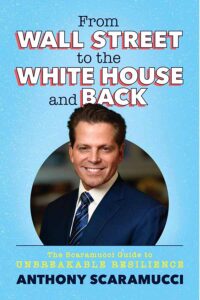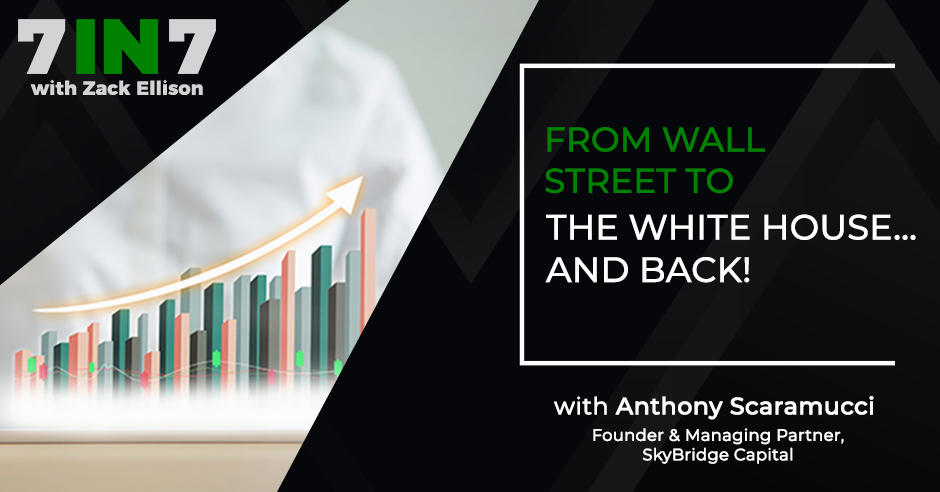
Listen to the podcast here
Download “The 10 Best Things To Know About Venture Debt” from https://7in7show.com.
Anthony Scaramucci, Founder and Managing Partner of SkyBridge, talks about his journey from working at Wall Street to the steps of the White House. Discover his investment principles, including the importance of long-term investing and the potential of AI and crypto ETFs.
In this episode, Zack and Anthony discuss:
- Long-Term Investing: The Recipe for Success
- Innovation as the Key Asset Class
- Diversifying Your Portfolio with Venture Debt and Private Equity
—
From Wall Street To The White House… And Back! With Anthony Scaramucci, Founder & Managing Partner, SkyBridge Capital
Anthony’s Journey
I have with me Anthony Scaramucci, the man, the myth, the legend, the Founder and Managing Partner of SkyBridge. Anthony, it’s great having you here. Thanks for joining.
It’s good to be on. I’m showing you my lifelong suffering, Zach. I’ve got my Met shirt on. I’m heading over to the Met Game later. If you like pain, you can join me and become a Met fan, which has been a 50-year source of pain for me.
I was a Red Sox fan growing up, and so we had decades and decades of pain.
You guys straightened it out. You’ve won more World Series in the 21st century than the Yankees, so it was pretty cool.
People forget that the Patriots and Red Sox actually struggled mightily for many years, and so we went through pain and earned that team later.
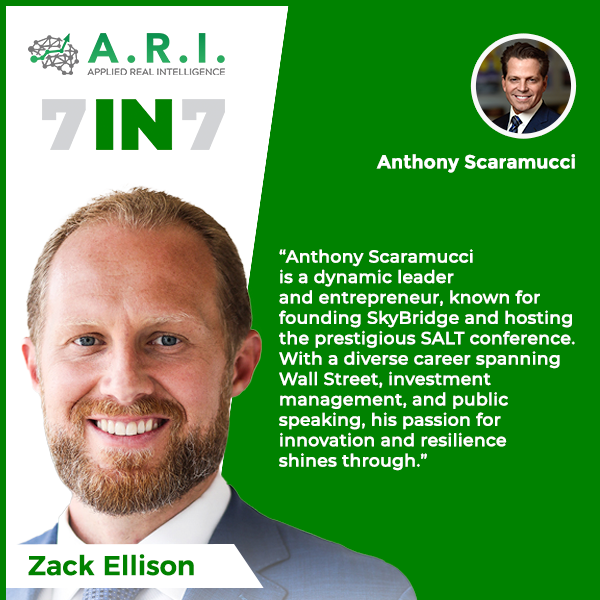
There you go. Good stuff. Yeah, maybe that’s up. Thanks for having me.
It’s great having you. I think the Mets will eventually be winners, so fear not. Just so everybody who’s reading knows more about your background, tell us about how you got here and we can talk about what you’re working on now.
My 30-second background, I grew up out here on Long Island. I went to a public high school and then on to Tufts University in Harvard Law School. I started my career on Wall Street at Goldman Sachs. I spent seven years there. I left in ‘96 to be a registered investment advisor. That was quite successful. We ended up selling that business to Neuberger Berman in 2001. Neuberger got bought by Lehman Brothers. People have a tendency to forget that. I worked at Lehman for about two and a half years. I went to see Dick Fold and told him I wanted to start another company. He, frankly, helped me do that in ‘05. I left and started SkyBridge.
SkyBridge is a couple of billion dollars under management. It’s a fund-of-funds platform. We do some venture investing. We do some crypto investing. We also have our SALT conference, which is the THAW Leadership Conference that we do four times a year around the world, which includes New York, Singapore, Hong Kong, and Abu Dhabi. It’s been a fun business.
I have my own podcast called Open Book about authors I like reading. I interview one author a week, which is a lot of fun for me. I do some public speaking. Some people will remember me from my ill-fated stint in Donald Trump’s White House. I spent eleven days in the White House. I got summarily fired after, frankly, an argument with him, which was fine. I stayed close friends with General Kelly and H.R. McMaster and those guys.
Here we are now, years later, very happy to be at SkyBridge, working again. It’s great to spend time with you. Obviously, you and I have some things in common as it relates to venture debt investing, which I think you have a super exciting business there. You’re going to have this big opportunity now to fill the void of a result of some of the banking collapses that are tied to that industry. As with you, Zach, I’m always looking for new opportunities and fun things to work on. Boring, I don’t like. Sometimes, in investing, you have to go with boring, but I like entertainment and I like fun in most parts of my life.
You’re somebody that’s always working on many, many things at one time, I feel like you’re always on the cutting edge of what’s interesting and relevant and profitable, quite frankly. What are you working on now and what’s top of mind for you?
I’m working on a couple of things right at this moment. I have a SALT Conference that we’re going to do in Hong Kong. That’s going to be a huge event for us. We’re trying to reinvigorate the relationship that we formally had with China. I’m spending some time in both Singapore and Hong Kong. I’m working on an artificial intelligence ETF, which I hope to launch in October 2023. Some of these AI ETFs, frankly, have not done well because they’re a little bit too diversified. We’re working on one that’s more concentrated.
I have a crypto ETF. Of course, it’s not the underlying currencies because we don’t have ETFs for those yet, but we do have a basket of publicly traded securities that are tied to the digital property, digital assets space. That’s done very well in 2023. Got smited in 2022, I might add. It’s up over 150% in 2023. I’m doing quite well there.
I’ve got this small fund. I’m not overly allowed to talk about it because it’s for accredited investors, but it’s basically a unicorn recovery fund. We closed that already, so I guess it’s okay to talk about it because we’re not accepting new money at this time. Those are some of the fun things that I’m working on. I’m also about to publish my seventh book. The title of that book is From Wall Street to the White House and Back: A Scaramucci Guide to Unbreakable Resilience. I’m in there, blasting away.
You’re probably going to get the last laugh.
Who knows? At least you got to cremate me because if I’m just in the coffin, I’m going to really try to pull myself out of the coffin. If you want me off the field, you got to cremate me.
With all those books behind you, how much reading do you do?
It’s interesting. Those boxes behind me are books that I’m giving away to the local library. I buy books probably 6 to 1 in terms of my capability to read them. I am a big reader. I’m not going to exaggerate if I can get through three books a month, which is a total of 36 a year, I’m talking about fully reading the book, that’s a home run for me. Some years, I do a little less, some years I do a little more. I’ve been doing a lot of traveling. I’m a big book tape, audio tape person. I’ve gotten through about 18 or 19 books thus far. I’m pacing quite well to get that done.
Any favorite books on the investment side that you’ve read at any time?
I love The Psychology of Money. I don’t know if you’ve read Morgan Housel’s new book. It’s actually not that new anymore. I tell people, when I go speak at a college, “You should read Lawrence Cunningham.” The Essays of Warren Buffett has produced, which basically his annual reports condensed by Professor Cunningham from Columbia. I still love it. It’s a classic. This is old now but it’s called One Up On Wall Street by Peter Lynch. I think that’s a very interesting book loaded with a lot of enthusiasm in terms of how to think about investing. Those are classic books to me.
I’m going to tell you something that’s really corny and somewhat esoteric, but I think it’s worth reading. I gave it to all my children. It’s Napoleon Hill. He wrote a book in the 1930s called Think and Grow Rich. In that book, there’s a mindset, there’s an idea about how you become successful and how you become financially independent. It’s about delaying gratification. It’s about paying yourself first. There’s another really small book I hand out to everybody called The Richest Man in Babylon. I don’t know if you ever heard of the book. It’s written by George Clayson.
I’ve read both books you mentioned.
Somebody knocked that book off and called it The Wealthy Barber back in the 1990s. It was the same book. What is the idea? Why is the man the richest man in Babylon? He’s able to pay himself first. He lives below his means. If you have a cable bill, then you should have a personal bill. You should have a Zack or an Anthony bill. In that, you pay yourself first. Every month for the last 30 years, I write a check to myself into my funds, into my family’s trust, and into the assets that my family holds. You do that for 30 years. I did it long enough, Zack. You do it in high-quality things that you don’t think about. It’s worthwhile.
I want to tell this story because I think this is elemental to our emotions getting tied to our money. I forgot an account. I don’t know what happened. I had an account at Goldman Sachs, and I bought 100 shares of Microsoft for my children in 1991. Those 100 shares of Microsoft is now 17 to 1 on the investment, many years later. I found the account and I’m looking you straight in the face and telling you I would’ve sold those shares during the Steve Balmer years as the company was languishing, but I didn’t sell them because I didn’t know I had them.
There they are. Now the company is flourishing. Yes, you can get a situation where you’re buying it to something like AIG, it goes bankrupt, or a GE, which you think is a storied company, then it goes bankrupt. Generally, when you’re buying quality and you sit on quality for very long periods of time, you do quite well. That’s the big lesson for me.
When you're buying quality and you sit on quality for very long periods of time, you do quite well. Share on XInvestment Principles
You just hit on two of the most important lessons in investing. One is the power of compounding. The other is being a long-term investor, being in the market consistently, not overtrading, and letting behavioral aspects lead you to bad decisions. Selling when you’re scared and buying, you’re overly exuberant. That’s a great segue into the next question, which is, what are the other key investment principles that, that you live by, that you think others should as well?
I know this sounds nuts, but think like a dead person. What do I mean by that? If you look at Charles Schwab’s accounts, you can find this on Google: the best-performing accounts show that Charles Schwab is the dead people. Why? The dead people don’t look at the accounts. They don’t focus on it. We have a tendency to be very tied to our emotions. If you were a seller in 2022 of growth, maybe you did okay, but look at where growth is now. If you sold your Facebook stock down 65% and said, “I’m done with Mark Zuckerberg,” he’s up 150% in 2023. I would prefer people to just think about holding high quality. I like to tease my clients. I tell them, “Everybody’s a long-term investor until they have short-term losses.”
The minute they have short-term losses, they snap a match to their hair, they run around in a circle and start yelling at everybody. It just doesn’t work that way. There’s no free lunch on Wall Street. There’s no perfect scenario. It’s only your golf partner who you’re playing golf with on the weekends that has a perfect portfolio. He’s the one that’s going to be whispering your ear that he bought Uber before it went public, or he owned SpaceX. He’s a guru and a genius. The rest of us are fallible. The rest of us make mistakes in our portfolio. I’ll tell you where you don’t make a mistake is in duration. The longer you can hold your assets, if they’re high-quality assets, the better you’re going to do. That’s the recipe to my success.
I’m not the richest person on Wall Street by any means. I’ve taken a lot of risk in my career, I’ve had some oscillations, I haven’t taken any risk in my personal investment discipline. When I say not taking any risk, of course, I’m in the stock market. Therefore, I have risk. I’m just explaining that if you put money into working for 30 years in the stock market, you don’t have risk because you will be betting on mankind or womankind. You’ll be betting on long-term growth and innovation. Not to tie it all back to your business, you have a phenomenal footprint because you are investing in growth, early-stage ideas. It could be a late-stage venture or intermediate-stage venture, this is the stuff that people are going to be looking at in fifteen years. This is the stuff that’s going to be in the top 5 or 10 of the Dow 30 in 15 years.
You’re looking at it from a debt structure where you can get pretty high coupons because they’re emerging companies. You probably have some preferences in there for yourself for your LPs, where they can potentially get a little bit of an equity kicker. All of those things should be in somebody’s investment portfolio. People have to think of a pizza pie chart. I’m not just going to own one thing. I’m going to own a collection of things and I’m going to be patient and sit tight.
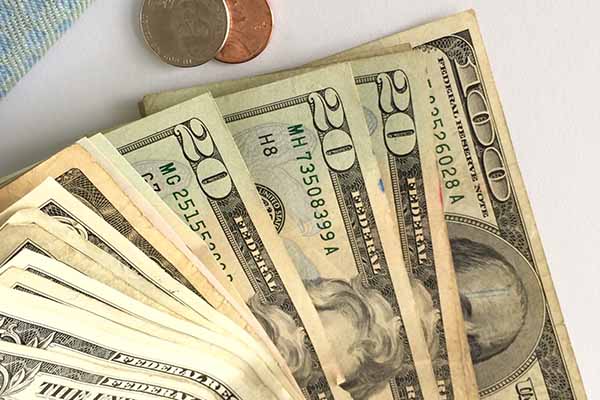
Wall Street: People have to think about not just owning one thing but a collection of things while being patient and sitting tight.
It’s interesting that you bring that up because I think about innovation as the asset class right now. A lot of people don’t think of innovation as an asset class. If you think of where you’re going to make money in the long-term, it’s got to be through innovative companies because innovation is what’s driving value creation. Ultimately, where you choose to play depends on your risk sentiment. Also, many other factors. It could be later stage large-cap tech like Meta or other companies like that. It could be early-stage venture equity.
Venture that’s right in the middle in the sense that we are investing in the best VC-backed companies, we’re doing it through a structure that’s a lot safer than equity because we’re senior secure and we’re earning a mid-teens coupon every year. We’ve also got equity participation in all the deals. The way I think about it is innovation is the asset class that I love. I think almost all value creation is coming from that. How do I want to play it? I think what you just said about being diversified makes a lot of sense. You want to have exposure to all of those different types of innovative assets. Are there any that you like particularly right now in the innovation space?
I’ve made most of my investments in fintech. I own Chime, the Neobank. I own Plaid. I own some of the crypto exchanges like Kraken on the private side. I own some Bitcoin miners that did very poorly in 2022 and did well in 2023. Where I want to go is in AI. Where I want to go is in some of the things that you’re looking at. I think what’s extraordinary about what’s going on right now is that because of the Silicon Valley Bank situation or the First Republic situation, you’re going to see opportunity. You’re going to see opportunity where you’re going to have more people to lend to. You’re going to see an opportunity where people like me or you can enter that space more easily because you just have less participants. You have less players.
I like all that. You’re in the right space. I love the way you’re doing it because you have a defensive position in terms of where you are in the capital stack. You’re going to get that high coupon return, but then you’ve also got potential equity upside. I like the way you think about it. I think we went through a very wickedly bad market, a bear market. I think we’re on the other side of it now. People are looking at this stuff. I was with somebody literally in Silicon Valley. I was down on Sand Hill Road and I was talking to a group of guys. There is a burning ember smell in the room.
People have been blown up and blown out and they’re exhausted. I said to a couple of young guys, they were in their late 30s, I said, “This is very reminiscent to me visiting Silicon Valley in 1999 into the ‘01 period. After the Nasdaq crisis debacle, a few short years ago for me, but a lot of 30-year-olds don’t remember it, people were blown out and they were feeling pretty terrible. If you stepped back and looked at the macro, it was 25 years of the best investing in the history of the world.
Think about if you had just held your Amazon, or think about it if you bought early into Facebook, before it went public, or 2000, Google wasn’t even public. Zack, Google went public in August of ’04, and the stock was traded sideways for a while. Think about that. Think about what Google became. You’re sitting on the future Googles and future Facebooks. I want to be a part of that. I’m excited about it.
Lessons From Investment Cycles
You’ve seen many cycles over your career. What are some of the lessons you’ve learned, either mistakes that others have made or maybe even mistakes you’ve made that you’ve taken with you to learn from?
I’ve made so many mistakes. I don’t even know where to begin. This doesn’t reflect well on me, but this is nakedly honest. I would say overconfidence. Anywhere where I’ve been in a situation where I have been overconfident, I have literally gotten smited or hit by a UPS truck. I would say that was true in the Trump administration. That was the wrong job for me. I probably shouldn’t have taken that job, but I took that job for ego reasons. I took it for pride reasons. It didn’t work out well for me. I would caution investors, whether it’s their career decisions, even their personal relationship decisions, or investing. Take your pride, take your ego out of the decision-making, you’ll make way better decisions.
If you set aside your pride and ego when making decisions, whether it's about your career, personal relationships, or investments, you'll make better choices. Share on XI had a buddy of mine that walked away from being the secretary of the Army. He had spent time with Donald Trump. I’m not trying to make this about the president. He spent time with Donald Trump and he made a decision that his personality wasn’t going to gel well with Mr. Trump. Even though he had the appointment, he recused himself and stepped away from the appointment.
That was clear thinking. That was objective thinking. I would tell you, I’ve been too big in certain positions that have gone to zero on me. I bought into a home healthcare company that I thought was going to be the Home Depot of home healthcare. The population is aging, etc. It turned out that people, for whatever reason, are comfortable at Home Depot. They’re comfortable there versus their local hardware store.
It turned out that when it relates to home healthcare, they’re more comfortable with the mom-and-pop place in their local area because I guess it’s sensitive stuff patient-related, like a going to a doctor-patient relationship versus a factory-like healthcare response. I got destroyed in that. I lost all my money in that. When I say I lost all my money, my investment went to zero. I can tell you one mistake after the next, but they’re typically born from overconfidence.
I would tell people, “When you’re thinking about making a private equity investment, think small. Also, instead of making that investment, why not put the money just in Berkshire Hathaway? I bet you would do better. You’d have less zeros in your portfolio.” I have done well, too. I bought into a couple of spirits companies have done very well. I bought into a tequila company, a rum company. They’ve done very well. I’ve also had my sets of zeros as, as well. Patience, lack of ego, those are the things that will help you in your life.

Wall Street: Patience and lack of ego will help you in your life.
This idea of overconfidence is one that I think about a lot. Actually, I’m getting a Doctorate degree at the University of Florida in Business. I’m a little more than halfway through. One of the themes we talk about quite a bit is this theme of overconfidence in investing and how, generally, it’s a bad thing. When I think about the startup system, you have to be overconfident and a little bit crazy to start a new company. You have to be overconfident because if you look at the numbers and play the percentages, no new companies would ever be born because most fail. Even those that are successful aren’t very successful in most cases. I always have this this little battle in my head, essentially, of what’s the right level.
You have to be incredibly confident in yourself battle. You have to bet on yourself like you and I have. You also have to rein in that overconfidence because we can’t be the best at everything. There’s going to be mistakes that we make. That’s just something I think about a lot because I’m talking to founders every day of the week, essentially, and I want to see confidence in them, but I don’t want to see hubris. I think there’s a fine line between overconfidence and the right level of confidence.
Here’s the beauty of the everything that we’re talking about. You can make mistakes. That’s the greatest thing. You don’t have to be in a straight 45-degree angle, everything’s perfect about your portfolio. I think there’s only one person that I know who had that, and he went to jail for 150 years. That was Bernard Madoff. He was telling people he had this perfect system. They bought into it. I didn’t know him. I’m not one of these history revisors where I said, “I knew the guy was a fraud.” I didn’t know he was a fraud. I’m just saying you have this 45-degree straight-line angle like this, without any imperfection in it. It’s probably something you want to avoid.
The flip side though is embrace the mistakes. You asked me a really good question. What did I learn from these mistakes? Be humble. Don’t be overconfident. Recognize that there are so many things out of your control. Not to get morbid, I lost a very dear friend to brain cancer. He was a 58-year-old young, vigorous guy. There’s no control. There’s so many things about your life, so many variables in your life that you can’t control, that being one of them. Certainly, he didn’t want to have brain cancer and he didn’t want to pass so quickly at such an early age. If you recognize that there’s these things in your life that you can’t control, you’ll get more comfortable when things are not going your way.
That’s one lesson I’ve learned the hard way. There are so many factors that are going to go against you that you might not foresee that you can’t control. My takeaway from a lot of this is that people should bet on themselves. There’s one thing I’ve done right in my career. It’s bet on myself. When I haven’t done that, that’s typically when I’ve been wrong. It doesn’t mean that I’m always right.
Let me tell you this. I think you know this. When you are betting on yourself, it’s exhilarating. I would rather bet on myself and fail and have the experience of betting on myself than not bet on myself. In other words, the fear-based life is a life less lived. You know? I’d rather take the ride the ups and downs, people. I’ve had some very public failures. I got fired from the White House. I got torched by Sam Bankman-Friend in FTX. People forget my successes because I’m a public figure and the media wants to write about the car crashes, or a bad year at SkyBridge, or whatever it might be, but I look at those things and say, “I am so thrilled that I stuck my neck out.” I don’t want to be that guy.
The fear-based life is a life less lived. Share on XIt’s probably not totally appropriate for your show, but I’m going to share it anyway. I was at a cocktail party. I was a vulnerable 30-year-old. I had just left Goldman Sachs and left a big job with big income to do something on my own. I’m sitting there at the cocktail party. There’s a Goldman Sachs guy there. He looked over at his wife and he goes, “I’m not like Anthony. I haven’t failed at anything.” I thought to myself, “It was a dig on me. There was an expression of his insecurity,” but then I was thinking about it. It made me feel bad for a moment. After the moment passed, I was like, “I want to fail at things.”
I want to push myself into things. I’ve written books. I’ve developed the Fall Leadership Conference. I have an asset management business. I’ve got a relationship database of over 100,000 people. I’ve given public speeches. I’ve had ups and downs, twists and turns. I’ve flown on Air Force One. I’ve worked in the White House. I’ve given a White House press conference. I’ve been on reality television, whether it was celebrity Special Forces, jumping out of helicopters, or in the Big Brother for 10 or 12 days. My point is why not fail and get all of the positives of the risk-taking than sit there and say, “I can’t make a mistake. I can’t do anything that’s risk-oriented. Otherwise, I could look foolish or embarrass myself.” I think those are big lessons, Zack, for people.
That might be the biggest lesson. That goes back to the book you mentioned by Napoleon Hill, Think and Grow Rich. It’s really thinking positively. We’re not being afraid to embrace challenges and adversity. I think about what causes growth. It’s not when everything’s easy. Think about any area of your life, whether it’s writing a difficult paper in college, or getting stronger in the gym, or closing a big deal. These are things that we oftentimes fail at, at first, and then we have to fight through them. That’s the process that causes growth. It’s a challenge of adversity.
We agree. I totally agree with that.
Alternative Investments
Turning the tables, I wanted to talk to you about alternative investments. This is an area that you’re an expert in. I would love to understand, for our readers, mainly, how alternative investments are beneficial to portfolios, and ultimately, how investors should try to access some of these alternative investments.
In the context of a broad portfolio, I think you have to have money and venture, money and venture debt, some hedge fund exposure. I think you have to have a small piece in speculative assets, because what we have found over time that enriches the portfolio. You may remember the book Pioneering Portfolio Management. When David wrote that book, he was pushing venture capital private equity. Of course, this was David Swenson, the CIO from Yale. He’s no longer with us, but he had this brilliant thought that longer-term duration, longer-term assets would yield higher results, create more alpha.
I tell people that are wealthy, or even people that are aspiring to be wealthy, have some stocks, have some bonds, more stocks and bonds, frankly, because you want to be on the growth side of things, but then own some of these other assets. Have a toehold in your fund or my fund because you want some of the brightest minds in the world, which you’re going to get in the world of private equity or venture, venture debt financing, or hedge fund management.
You’re going to get some of the brightest minds in the world and you’ll be able to avail yourself to those. That’s my thought. When I started SkyBridge, the idea was that there was a dentist in Davenport, Iowa. He’s got a financial consultant. They’re giving him a stock and bond portfolio. He can’t get access to Steve Cohen, Dan Loeb or Paul Singer at Elliot. What if I create a vehicle for him where there’s a $25,000, $50,000 minimum? Let’s say that person has $1 million of net worth. They want to put 5% of their money in hedge funds, which we think is a good idea.
Now they get access to some of the greatest hedge fund managers in the world. They can do it through my pass-through vehicle. We’ll do all of the quantitative and qualitative risk analysis for them. We’ll be their outsourced chief investment officer for their hedge fund portfolio at a very modest fee to do that. It’s worked out well. We have over 6,000 clients in that business. It’s worked out quite well.
I really like your SALT Conferences as well, because they bring together some of the best fund managers with the best allocators. I’ve really enjoyed going to those. I think they create a lot of value and a lot of learning opportunities and networking opportunities.
I appreciate that. That’s the goal of it. I was in Minneapolis, and I was on the conveyor belt there to go through the security line at the airport. Somebody tapped me on the back. I turned around. He said, “Anthony.” I said, “Yes.” “I just want to introduce myself. I just want to let you know that I attended your 2011 SALT conference in Las Vegas and I met two people who helped me get this fund started 10, 11 years ago. I started with $30 million under management. I have $500 million now and those guys have become great investors of mine. Without the SALT Conference, I wouldn’t have met them.” I got to tell you, it was phenomenal. I didn’t get paid for that or anything like that, but that was the goal.
I’m not looking to get paid. It’s a non-linear transfer of goodwill among people. I was thrilled. I say, “This is a great story. I’ll be telling this story someday on Zack’s podcast.” That’s the karma that you want to create in the world. I want people to win. I am a big believer in people winning, and I’m a big believer in collaborating.
I tell my kids, “I can only give you two gifts. Forget about the money. Whatever is left over after I’m long dead, that’s not really going to be that helpful to you, believe it or not, because you’re either going to be happy or not happy. The money’s not going to matter as much as people think. What will make you happy is celebrating the successes of your friends. What will make you happy is do the thing that you really want to do in life. You have to do that because if you do that, you’re never going to work a day in your life. Just go do that.” What does Mel Brooks say, Zack? “Relax. None of us are getting out of here alive.” What a great line about life, right?

Wall Street: Money’s not going to matter as much as people think. What will make you happy is celebrating the successes of your friends and doing the thing you really want to do.
True. The point you made about growth not being linear, you made that in the context of investing, but also just in life. I think about that all the time. People tend to quit when things get difficult or they sell their investments when they’re down. I think one of the lessons I’ve learned is just stick it out. It really is darkest before dawn. Every time where I’ve felt like I’m at a dark point, something happens that totally changes that.
It’s that ability to be persistent. That, to me, also is what makes great founders because every single company is going to go through challenges, especially early-stage companies, and most will throw in the towel. Those that don’t are going to be the winners. I’m always betting on them the same way you are. I love to see people be successful. I’m not a hater. There’s a lot of haters out there. They look at what others are doing they’re like, “Yeah, I could do that.”
What kind of energy is that? There are a couple of negative energy sources that have no value. Number one is to be a hater. I don’t have the time for that. Number two is to be a victim or to be a person filled with regret. On my podcast, I had Robert Greene on The 48 Laws of Power. He’s a bestselling author. He said something to me, which totally rang my bell. He is like, “You can’t have regrets.” What kind of sentiment is that? Okay, I made a mistake in my life. I got married and divorced, or I failed at an investment, or I failed at a business venture. Who cares? Don’t spend any time or energy on that. Focus on today and focus on the future.
People are like, “You got fired from the White House.” Yes, I did. I don’t wake up in the morning and kick myself in the pants and say, “I did 5 or 6 stupid things, got my ass fired from the White House. I take the millstone of regret and victimization, take it off my neck and put it beside me, and then I go forward to enjoy my life.”
I think it’s a big message for people. They have to think like that. They’ll just be so much happier. These are precious times for us and times are getting better, by the way. Despite what the news is reporting and all this stuff, we’re getting better. We just developed a paint that we can put on the rooftops of all these buildings now, and it will absorb the sunlight as opposed to overly reflecting back into the atmosphere. It’ll help stabilize the Earth’s temperature.
That’s cool. Now, more stuff like that’s going to happen. There’s more stuff coming out with the mRNA technology that could potentially help us with our immune system related to cancers and different things that are going on. We may be able to extend our lives a little bit. That’s going to happen. You’ve got an age of abundance that we’re about to come upon. Why not embrace it? Why not enjoy it? Don’t sit there focused on every negative thing that’s happening. Yes, we rubber neck. We like looking at car crashes. As we drive by the cars, we stare at those. Good news doesn’t make the paper. I’m probably having the best year of my career after having a disastrous year.
I had a really bad year. It was incredibly well documented. There was one woman from Bloomberg. I must have dated her in a past life or something. She wrote a series of negative articles about me. She was firing out a negative article once a month. She had a big crescendo. I’m the most terrible person on the planet article. I read the article and I laughed.
Here’s the thing. She wanted to come to the SALT Conference. She’s a journalist at Bloomberg. My staff was all upset with her and they weren’t going to allow her registration. I said, “What? Are you crazy? Let her come. I don’t care. I believe in the First Amendment. I believe in free speech. I’m a public figure. She can write whatever she wants. If you are that small-minded, you’re not going to let her come to the conference, let her come. I don’t care.”
Here’s the thing. I’m having a phenomenal year. No one’s going to write that. That’s fine. You’ve got to accept those are the laws of, of our civilization now. That’s how things work. You can’t be self-flagellating or feel any victimization. You roll with it. You can’t be a baby, I guess, is the point I’m making.
You also just showed in real life that it’s darkest before dawn. You had a rough year and now you’re killing it. One quick thought is maybe that reporter didn’t like you because you didn’t date her in a past life.
I’m sure if I dated her, she would’ve been more pissed.
Parting Thoughts
Parting thoughts, anything you want to leave us with about what you’re going to be doing next or what we should be thinking about?
I got my book coming out, which I’m excited about. We’re going to be doing these conferences that I mentioned. I’m hoping to make an acquisition at some point to bolt-on acquisition of the SkyBridge, which hopefully I can make an announcement about. I’m excited. I’m excited about the future. One thing Buffett said, which I totally agree with, you get better as you get older in this game because you get more patient, you get wiser, you’re more humbled, you’re more psychologically minded. If the good Lord keeps me on the planet and I stay healthy, I’m looking forward. I think the best years for SkyBridge are ahead of us and I’m looking forward to that as well.
I agree with that point. I feel like the more gray hairs I get in my beard, the better my performance is in my investment portfolio. It’s almost a direct correlation of one-to-one.
I totally agree with that.
Anthony, thanks so much for coming on. I feel like I always learn something from you. The last thought is, what’s the best way for people to follow you or keep up on what you’re doing?
You can go to my podcast, Open Book, anywhere where you get podcasts, the Spotify or Apple Podcasts. You can also follow me on Twitter at @Scaramucci or Instagram at @Scaramucci. I’m not on Threads yet. I’m too loyal to Elon Musk. I probably won’t go on Threads, but those are places you can find me.
Thanks again for coming on. Thanks, everybody, for reading the episode with Anthony Scaramucci.
It’s great to be here.
Important Links
- Anthony Scaramucci
- SkyBridge
- Open Book
- From Wall Street to the White House and Back: A Scaramucci Guide to Unbreakable Resilience
- The Psychology of Money
- The Essays of Warren Buffett
- One Up On Wall Street
- Think and Grow Rich
- The Richest Man in Babylon
- The Wealthy Barber
- Pioneering Portfolio Management
- The 48 Laws of Power
- Spotify
- @Scaramucci – Anthony Scaramucci Twitter
- @Scaramucci – Anthony Scaramucci Instagram
- America’s Great Divide: Anthony Scaramucci Interview | FRONTLINE
- Instagram – 7in7 Show
- TikTok – 7in7 Show
- YouTube – 7in7 Show
- Facebook – 7in7 Show
- Twitter – 7in7 Show
- LinkedIn – Zack Ellison
- iTunes – 7in7 Show
- Spotify – 7in7 Show
- Work with A.R.I.
- DISCLAIMER
About Anthony Scaramucci
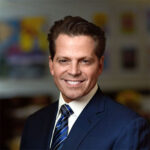 Anthony Scaramucci is the founder and managing partner of SkyBridge, a global alternative investment firm, and founder and chairman of SALT, a global thought leadership forum and venture studio.
Anthony Scaramucci is the founder and managing partner of SkyBridge, a global alternative investment firm, and founder and chairman of SALT, a global thought leadership forum and venture studio.
Prior to founding SkyBridge in 2005, Scaramucci co-founded investment partnership Oscar Capital Management, which was sold to Neuberger Berman in 2001. Earlier, he worked in Private Wealth Management at Goldman Sachs & Co.
In 2022, Scaramucci was ranked #47 in Cointelegraph’s Top 100 Influencers in Crypto and Blockchain. In 2016, he was ranked #85 in Worth Magazine’s Power 100: The 100 Most Powerful People in Global Finance. In 2011, he received Ernst & Young’s New York Financial Services “Entrepreneur of the Year” Award. Anthony is a member of the Council on Foreign Relations (CFR) and a board member of the Federal Enforcement Homeland Security Foundation. He is the author of five books.
Scaramucci served on President Donald J. Trump’s 16-person Presidential Transition Team Executive Committee, and in 2017 briefly served as Chief Strategy Officer of the Export-Import (EXIM) Bank and White House Communications Director.
Scaramucci, a native of Long Island, New York, holds a Bachelor of Arts degree in Economics from Tufts University and a Juris Doctor from Harvard Law School.
